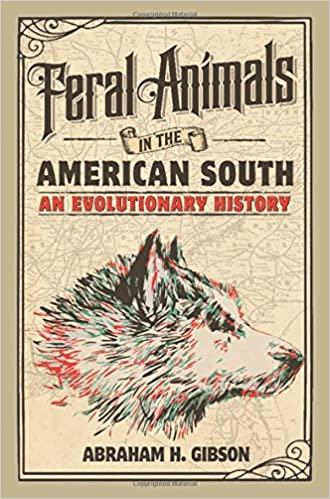
Abraham Gibson explores the history of the Southern United States through its feral animal populations, providing us with an understanding of how domestication and the wild have informed each other over the last four hundred years.

Abraham Gibson explores the history of the Southern United States through its feral animal populations, providing us with an understanding of how domestication and the wild have informed each other over the last four hundred years.
 Abraham Gibson is Assistant Professor in the Department of History at the University of Texas at San Antonio. He teaches courses on the history of science, technology, engineering, medicine, and the environment, and his research examines topics such as the domestication of animals, the evolution of cooperation, and the relationship between technology and society.
Abraham Gibson is Assistant Professor in the Department of History at the University of Texas at San Antonio. He teaches courses on the history of science, technology, engineering, medicine, and the environment, and his research examines topics such as the domestication of animals, the evolution of cooperation, and the relationship between technology and society.
In this episode of Perspectives, we speak with Abraham Gibson, author of Feral Animals in the American South: An Evolutionary History.
In his book, Abe Gibson tells the broader social and environmental history of the Southern United States by focusing on the domestication and subsequent ferality of dogs, horses, and pigs over the past three hundred years. Gibson discusses the co-evolution of humans and domesticated animals both in ancient history and the more recent development of the United States, and highlights how and why the open range in the U.S. South lasted longer than in other parts of the United States. Dr. Gibson uses the differential experiences of feral horses, dogs, and pigs to explore broader themes of commerce, sport, environment, and politics in Southern history from the colonial to the modern era.
Abraham Gibson was a 2014-2015 Postdoctoral Fellow at the Consortium for History of Science, Technology and Medicine.
This podcast features a number of questions for Dr. Gibson from Simon Joseph, a former staff member of the Consortium who currently works in the offices of the American Philosophical Society.
To cite this podcast, please use footnote:
Abraham Gibson, interview, Perspectives, Consortium for History of Science, Technology and Medicine, April 30, 2021, /video/119.
Closed-captioning available on Youtube.
The Consortium's collections provide many opportunities to learn more about environmental history, animal-human relations, and the history of the American South.
Our cross-institutional search tool allows researchers to investigate materials across multiple institutions from a single interface. With more than 4.4 million catalog records of rare books and manuscripts, the Consortium's search hub offers scholars and the public the ability to identify and locate relevant materials.
The Farmer's register, a montly publication devoted to ... agriculture, ed. Edmund Ruffin, The Library Company of Philadelphia
Agriculture, geology, and society in antebellum South Carolina: the private diary of Edmund Ruffin, American Philosophical Society
An essay on calcareous manues, by Edmund Ruffin, Hagley Museum and Library
The natural history of Carolina, Florida, and the Bahama Islands, by Mark Catesby, The Library Company of Philadelphia
Mark Catesby: The Colonial Audubon, by George F. Frick and Raymond P. Stearns, Linda Hall Library
John Bartram correspondence, 1735-1775, American Philosophical Society
Travels in Georgia and Florida, 1773-74: a Report to Dr. John Fothergill, by William Bartram, American Philosophical Society
Kerri Clement, Wonderland's Festering Wound: Indigenous Peoples, Animals, and Brucellosis in Twentieth-Century Yellowstone and Montana Borderlands
Benjamin Cohen, The Future of Agriculture: A Technological History
Whitney Robles, Gathering the Animals: Natural History in America to 1815
© 2025 Consortium for History of Science, Technology and Medicine | Copyright Infringement